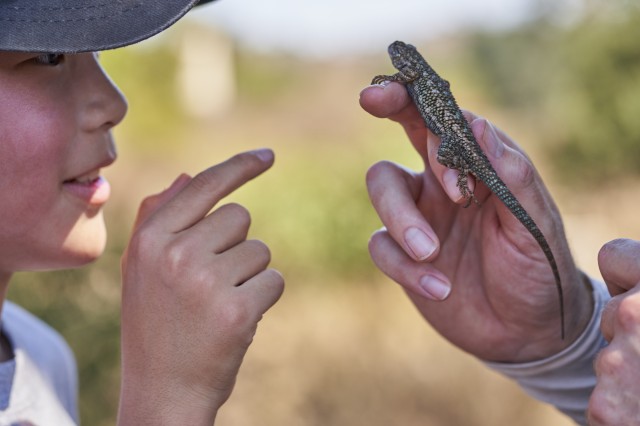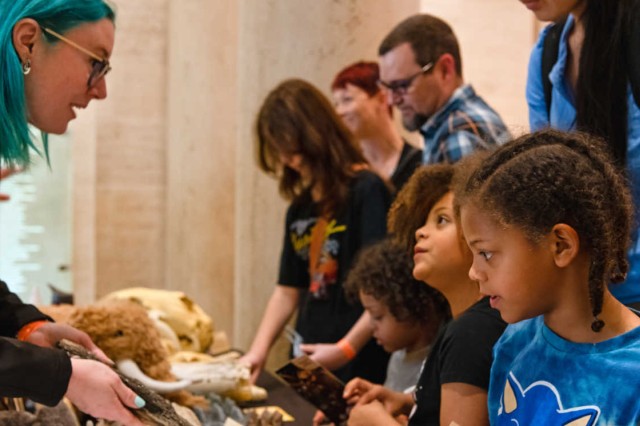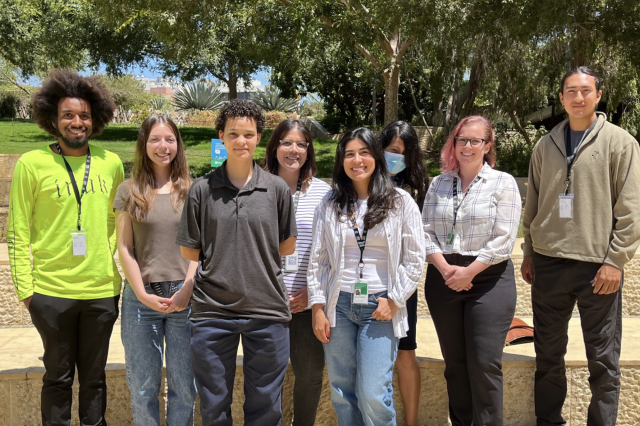NHMLAC IDEA Transformational Framework
The Inclusion, Diversity, Equity and Access (IDEA) Transformational Framework supports bold, systemic, institutional change throughout NHMLAC. It is inspired by a letter that was written by a self-selected group of BIPOC (Black, Indigenous, and People of Color) colleagues and presented to NHMLAC’s President and Director on September 10, 2020.
This framework highlights the institution’s challenges and opportunities with regard to racial equity. The IDEA Working Group (IWG)—a cross-departmental, multilevel team of 47 staff members—with input from the NHMLAC Board of Trustees and executive staff, developed the IDEA Transformational Framework, a living document that will coevolve with the institution and shape its behavior and practices moving forward.
INCLUSION, DIVERSITY, EQUITY, and ACCESS (IDEA) TRANSFORMATIONAL FRAMEWORK
A Living Document
STATEMENT OF INTENT
NHMLAC and museums across the globe are reckoning with the legacy of colonialism, which, by empowering systems of racism and patriarchy, has shaped collections, research and other practices over centuries. Our colonialist history and the inherent characteristics of white supremacy culture continue to negatively impact people of all identities in our museums' internal and external communities.
As an institution of, for, and with Los Angeles, NHMLAC commits to dismantling oppressive structures within our work, including, but not limited to: anti-Black, anti-Indigenous, anti-Latino/a/x, and anti-Asian racism; white supremacy; ableism and heteronormative patriarchy. Valuing inclusion is not enough when disparities caused by a long history of systemic oppression continue to the present day.
NHMLAC must become an actively intersectional anti-racist institution which performs the entirety of our work through the lens of inclusion, diversity, equity and access (IDEA), enabling our mission through stronger connections with our staff and community.
FUNDAMENTAL IDEA GOALS
• Repair and build equitable partnerships with those who have been systematically underserved or excluded by publicly acknowledging past harms and pursuing a clear path forward with IDEA work that is informed by internal and external stakeholders.
• Evaluate and report on our process and progress with IDEA work in the NHMLAC Strategic Plan, and commit to measurable change.
• Establish policies and practices that support and are reflective of NHMLAC’s IDEA values, and which embrace perspectives beyond the dominant cultural group.
• Commit to IDEA-specific staffing.
• Participate in IDEA work at the L.A. County, national, and international levels which examines and challenges museum constructs resulting from systemic racism and other forms of oppression.
• Expand NHMLAC’s perspectives, practices, internal culture, and policies beyond those of the dominant cultural group, particularly white colonizers.
• Establish an IDEA Working Group (IWG) a multi-level and cross-departmental team of NHMLAC employees charged with developing and activating IDEA values. Each staff member diligently acted as stewards of this process.
• Disseminate IDEA information and resources on a dedicated Intranet page.
NHMLAC ASPIRES TO BE:
ANTI-RACIST: Make deliberate choices to disrupt patterns and manifestations of white supremacy culture.
INTERSECTIONAL: Respect the ways that overlapping identities create unique prisms of discrimination and oppression.
ACCOUNTABLE: Build trust and a culture of responsibility by productively addressing conflict, and creating and communicating opportunities for restoring justice.
EQUITABLE: Provide equitable and equal access to resources, services, and information across the NHMLAC community.
COLLABORATIVE: Cocreate museum initiatives with staff and community partners to include the perspectives of those most directly impacted.
KEY THEMES
Informed by the opportunities identified by our BIPOC colleagues in 2020, we will develop and implement a Racial Equity Action Plan centered around these five themes:
1. Cultivating an Anti-Racist Learning Community
2. Content
3. Science, Technology, Engineering, Art and Mathematics (STEAM) Pathways
4. Staff Recruitment and Retention
5. Transparency
1. CULTIVATING AN ANTI-RACIST LEARNING COMMUNITY
At NHMLAC, everyone is responsible for our institutional culture. To be a learning community that centers a commitment to IDEA, we must assess our existing culture, establish a Cultural Transformation Task Force, define goals for shifting our institutional culture, develop opportunities for training, and commit to and prioritize ongoing learning and personal growth for our staff, volunteers and trustees.
2. CONTENT
Content is what we communicate, consciously or not, about NHMLAC and our natural and cultural worlds, through exhibits, stories, programs, signage, collections, architecture and beyond. By using an IDEA framework and concrete metrics, we will ensure that content is inclusive and representative of all our communities, and that access to content is fair and equitable.
3. STEAM PATHWAYS
science│technology│engineering│arts│mathematics
At NHMLAC, all careers are STEAM careers. We must foster interconnected pathways that engage learners of all ages in the work of our museums, building applicable skills through authentic experiences, bridging gaps in position offerings, and providing mentor support. We must prioritize systematically disadvantaged participants, collaborating with community advisors to develop an intentional, research-informed approach. In doing so, we support the development of a more diverse and representative workforce in and beyond the museums.
4. STAFF RECRUITMENT AND RETENTION
Our place of work and the people within it have a significant impact on our lives. NHMLAC must therefore foster an organizational environment that is safe, welcoming, and nurturing to all internal and external stakeholders, especially members of the intersectional BIPOC community. Areas of focus will include but not be limited to: pay equity, recruitment from all communities, mitigating bias in professional development, and combating systemic racism in the overall employment experience.
5. TRANSPARENCY
NHMLAC must commit to a lasting culture of transparency and information equity, which includes measures of accountability and open communication with internal and external communities. Our strategies include: implementing new accountability policies and public reporting practices, providing pathways that increase equitable access to information, using metrics to track our IDEA initiatives, and adopting standards that promote, enforce, and maintain transparency. Our shift to a culture of transparency will hold our museums to high standards of accountability that support our IDEA efforts at all levels.
GLOSSARY OF IDEA TERMS
Accessibility: Giving equitable access to everyone along the continuum of human ability and experience. Accessibility encompasses the broader meanings of compliance and refers to how organizations make space for the characteristics that each person brings. (AAM)
Anti-racism: A form of action against racial hatred, bias, systemic racism, and the oppression of marginalized groups. Anti-racism is usually structured around conscious efforts and deliberate actions to provide equitable opportunities for all people on an individual and systemic level. (Singh)
Decolonization: A process that institutions undergo to expand the perspectives they portray beyond those of the dominant cultural group, particularly white colonizers. (AAM)
Diversity: All the ways that people are different and the same at the individual and group levels. Even when people appear the same, they are different. Organizational diversity requires examining and questioning the makeup of a group to ensure that multiple perspectives are represented. (AAM)
Equity: The fair and just treatment of all members of a community. Equity requires commitment to strategic priorities, resources, respect, and civility, as well as ongoing action and assessment of progress toward achieving specific goals. (AAM)
Heteronormative: The belief that heterosexuality is the default, preferred, or normal mode of sexual orientation. It assumes the gender binary and that sexual and marital relations are most fitting between people of opposite sex. (AAM)
Inclusion: The intentional, ongoing effort to ensure that diverse individuals fully participate in all aspects of organizational work, including decision-making processes. It also refers to the ways that diverse participants are valued as respected members of an organization and/or community. While a truly “inclusive” group is necessarily diverse, a “diverse” group may or may not be “inclusive.” (AAM)
Intersectionality: The interconnected nature of social categorizations such as race, class, and gender as they apply to a given individual or group, regarded as creating overlapping and interdependent systems of discrimination or disadvantage. (Columbia Law)
Justice: A concept of ethics and law that means that people behave in a way that is fair, equal, and balanced for everyone. (USCAN)
Lived Experience: Experiences that may not have an obvious relationship with a position’s qualifications, but have provided the individual with the knowledge, skills, and capabilities that would allow them to perform the work. (McIntosh & Wright)
Patriarchal: A social system in which men hold primary power and predominate in roles of political leadership, moral authority, social privilege, and control of property. Some patriarchal societies are also patrilineal, meaning that property and title are inherited by the male lineage (UW)
Privilege: A special right, advantage, or immunity granted or available only to a particular person or group. (UW)
STEAM Pathway: A STEAM pathway broadens the opportunity for those who might be interested in seeking museum careers by reaching students and non-students through a variety of interconnected touchpoints. These include: authentic work engagement, mentor support, and career opportunities, each of which can expose and inspire individuals to learn more about the fields of science, technology, engineering, art and mathematics. (NHMLAC)
White Supremacy Culture: The idea (ideology) that white people and the ideas, thoughts, beliefs, and actions o white people are superior to People of Color and their ideas, thoughts, beliefs, and actions. (SURJ)


